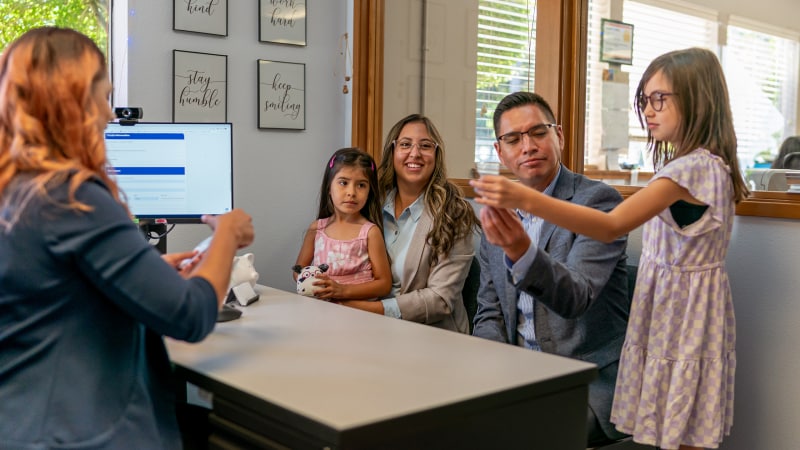How to open a bank account for a minor

Opening a bank account in your child’s name may help build financial literacy from an early age. Parents or guardians can use their child’s bank account to introduce topics such as budgeting, saving and earned interest in a way that makes personal finance fun and approachable. Let’s learn how to open a bank account for a minor and some helpful tips for the process.
Choosing a bank for a minor
Can a minor open a bank account? Though the age to open a bank account varies, many financial institutions offer bank accounts for minors, often with a few caveats. The first step in opening a bank account for a minor is choosing the right bank account. There are several factors that might be helpful to consider:
- Fees: Understanding any monthly maintenance or overdraft fees associated with the account may help prevent unexpected surprises down the road.
- Convenience: For some, the bank's location and whether it has local branches nearby may be an important element when choosing a bank. It might be helpful to see if they offer online banking services as well. An online bank account for minors may help make banking feel more accessible.
- Additional features: Many banks offer specialized accounts for minors, complete with features like parental controls and spending limits.
- Financial education tools: Additionally, some banks offer resources and tools to help your child learn about money and help cultivate healthy financial habits.
- Interest rates: Interest rates might be an important consideration, as these can impact the amount of money the account could possibly earn over time. This may also be a valuable teaching opportunity for the concept of interest.
Gathering your documents
To open a bank account for a minor, you'll typically need to gather a few standard documents, as well as some additional requirements specifically for minors. Typically, minors can use their birth certificate or social security card for their primary ID. Financial institutions usually require a parent or guardian to serve as a shared account holder, which will require the typical documentation required for opening a bank account.
Note that documentation requirements when opening a bank account for a minor can vary depending on the bank and the type of account you choose. When gathering your documents, be sure to review the bank's requirements carefully and ensure that you have this paperwork ready in order to avoid delays or complications in the account opening process.
Opening your account
Once you’ve chosen the account and have the required documentation in hand, the next step is to begin the account opening process. Depending on the bank and type of checking account, you may be able to open an account online. Some may require you to open the account at a local branch.
Note that in addition to any shared account holder requirements, there may also be minimum deposit rules or other account-specific factors to consider. For example, some banks may require that the parent or guardian also have an account with them. Checking with your bank to see what their specific requirements are can help avoid any potential speed bumps.
If you're opening the account in-person, you'll need to bring all necessary documentation and identification for both the minor and yourself, the parent or guardian. When opening the account online, you'll typically need to fill out an online application and provide digital copies of documents.
Tracking your transactions
Once your child's bank account is open, this is often a valuable opportunity to begin teaching them about money management and personal responsibility. Here are potential ways to use the account to help your child develop their financial literacy skills:
- Encourage them to keep track of their transactions: By regularly reviewing their account activity, your child can learn early on the importance of tracking expenses and sticking to a budget.
- Set savings goals: Helping your child set savings goals and monitoring their progress could help them develop discipline and learn the value of saving for a specific purpose.
- Discuss interest rates: If the account earns interest, it could provide an opportunity to help your child understand ways of earning interest over time.
In summary
By learning how to open a bank account for a minor, you may be setting up a valuable teaching opportunity for your child. Once the account is open, you can use it to teach your child about budgeting, saving and spending responsibly. Instilling these habits early on may help give your child the means to develop a strong foundation for future financial success.



